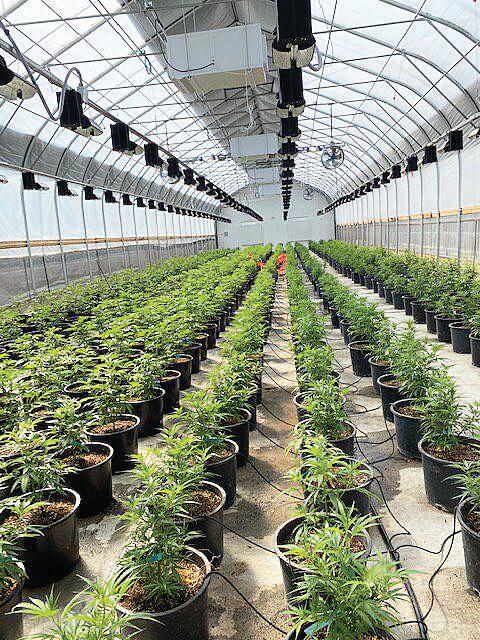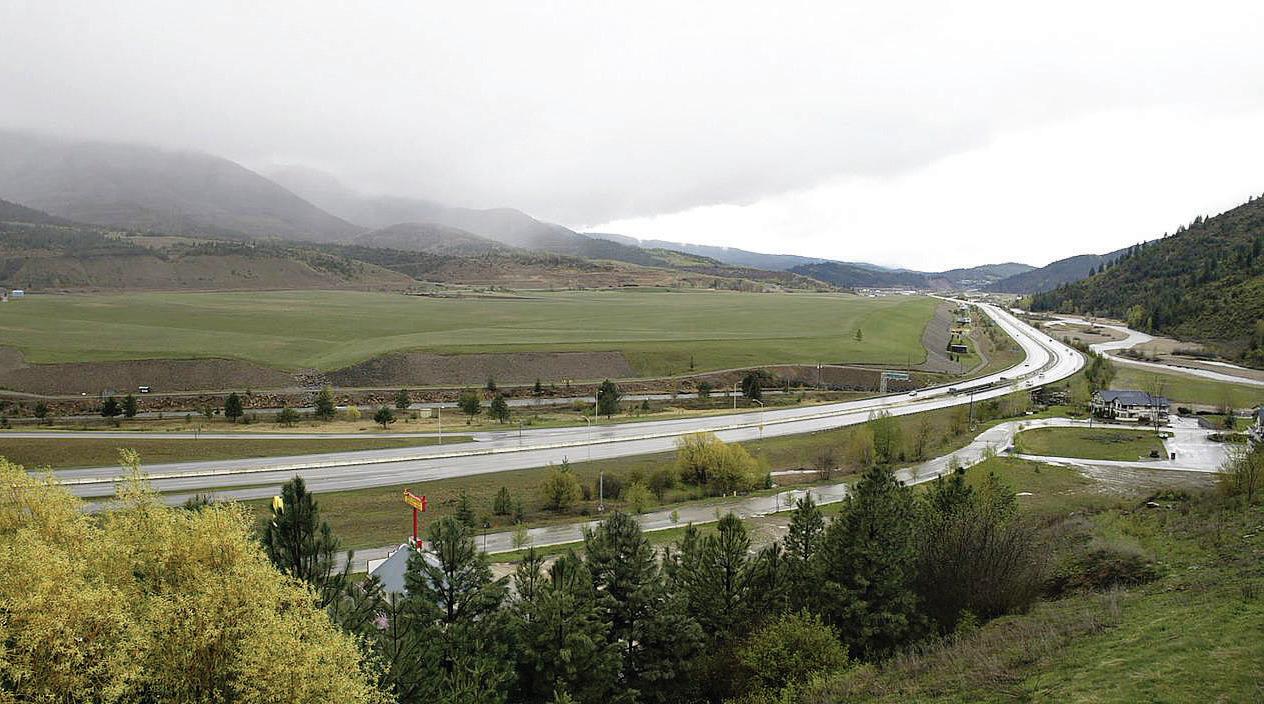
5 minute read
BUDDY BOY GETS BIGGER
SPOTLIGHT: Buddy Boy Farm expands with 2nd Tier 3 license
A look inside a Buddy Boy Farm greenhouse.
COURTESY OF BUDDY BOY FARM

A view of Buddy Boy Farm’s outdoor grow in Eastern Washington.
By Tracey Damon EVERCANNABIS CORRESPONDENT
Buddy Boy Farm is a big business in a tiny town, and it’s getting bigger. The cannabis grower and processor located west of Spokane near Reardan recently expanded with a second Tier 3 license, giving the company an additional 30,000 square feet.
“We now have 12 greenhouses on this (first) license,” said General Manager Galadriel Walser. “Last year we bought a second Tier 3 license so we added an outdoor grow, and now we’re building more greenhouses. By the time we’re done, we will have 24.”
Buddy Boy has been on the scene since the early days of legalization and was the ninth producer/processor in Washington to receive a state license.
“My father Steve Walser has been a farmer for 40 years now, but didn’t grow cannabis. Well, way back in his hippie days he did, but not officially,” said Walser. “When cannabis became legal he decided why not try it?”
So he dedicated a section of his 640-acre organic farm, known as Willow Wind Farms, to growing cannabis.
“Our very first year we were just an outdoor grow because no one really knew what they were doing. We had tractors, we used our old potato planter to make rows in the dirt to plant these things. We had no idea what to expect.” After an unseasonably warm fall, they yielded “this huge crop.”
Which is fitting, because Walser says her father always goes big.
“At the very beginning you had to apply whether you wanted a 1, 2 or 3 (tier) license. My dad always was like, well, you might as well get the biggest option, and decided to go for the Tier 3 license,” she said.
As the state’s cannabis industry got on its feet, many growers and processors struggled, including Buddy Boy. Walser says they all had to get creative to make ends meet and keep the business going.
“One thing we’re really proud of: we don’t have investors. So we’ve always had to be very frugal. We’ve MacGyvered things together, out of necessity.”
And it worked. While other growers threw in the towel, Buddy Boy prospered.
“The first year was really great because not too many people were able to get a crop off that year. Even the second year, there still wasn’t a ton of people in it (the business), but by the third and fourth year there were so many people in it that the prices plummeted,” said Walser. “People were going out of business left and right because they were selling for less than what it costs to grow.”
As companies left the industry and licenses became available, Buddy Boy purchased a second Tier 3 license and expanded. Today the company grows about 25 strains of cannabis. Walser says some fan favorites include Jet Fuel, Presidential Kush, DJ Kush, and a high-CBD strain called Amazing Grace. The company’s newest product is a line of CBD lotions using Amazing Grace and a blend of herbs.
Walser says even with the expansion, the staff is hustling to keep up with demand. She used to send out a menu to retail shops of what was available but says that’s no longer needed. Their products are being bought as soon as they are ready for market.
“Even before COVID we started to see an uptick in sales, probably about five months before COVID,” she said.
Buddy Boy has also increased staff to keep up with the size of the grow and demand. With 62 employees on board, they recently hit a milestone to be proud of.
“We have just been able to get medical insurance here. That’s a very big deal. (Buddy Boy’s employees) are very important to us.”
It’s also important to Walser to recognize how everyone at Buddy Boy has made the business a success, despite lean years, a lack of experience and entering a new industry that was also finding its footing.
“I feel like we were puzzle pieces. It took a long time to figure out each other’s ways and all fit together and all find our place and our mesh. But we have and it works really well.”
For more, visit www.buddyboyfarm.com
ASSOCIATED PRESS
Kootenai receives more anti-drug funds

COEUR d’ALENE – Kootenai County recently received federal funds to better focus on interstate drug activity. It is now part of the Idaho/Oregon High Intensity Drug Trafficking Area, which also includes Ada and Bannock counties in southern Idaho as well as 11 Oregon counties and the Warm Springs Reservation.
This designation by the U.S. Office of National Drug Control Policy provides grants to federal, state, local and tribal law enforcement agencies in a specific area to better coordinate activities and share information about illegal activity moving through the region, including cannabis.
Idaho State Police Capt. John Kempf said Kootenai County has had the highest amounts of illegal drug seizures in the state in the last few years, including methamphetamine from Mexico.
He said the Interstate 90 corridor, which spans 100 miles of Idaho, sees a large amount of drug activity. Many of those arrested say they are bringing product purchased legally in Washington and Oregon to the East Coast to be resold for a higher margin.
Source: Associated Press
Steves pushes legalization, equity
SEATTLE – Northwest-based travel guru Rick Steves is sharing a message nationwide that increased legalization of cannabis can help fight larger issues of racism.
Although he isn’t planning to travel in the next few months due to health concerns, Steves has been offering remote presentations to communities around the country, especially in the Midwest and the South. He calls it “preaching to voices outside the choir.”
“I just like to confuse people with what they expect they’re going to be dealing with,” he said. “I always like to say that I’m a hard-working, churchgoing, kid-raising American. If I worked hard all day and want to go home and stare at the fireplace all day that’s my civil liberty.


And then I get a big round of applause.”
Steves will also be a keynote presenter at the International Cannabis Business Symposium.
He has concluded that the right for adults to have and use cannabis is really a civil liberty issue, which is why he’s been involved in cannabis advocacy issues for more than 20 years. He’s an active member of NORML and the Marijuana Policy Project.
“I’m careful not to advocate smoking. I think anyone who wants to smoke marijuana responsibly as an adult should be able to do so,” he said, adding that the current prohibition is “racist and counterproductive and it’s just wrong.”
Source: Leafly










